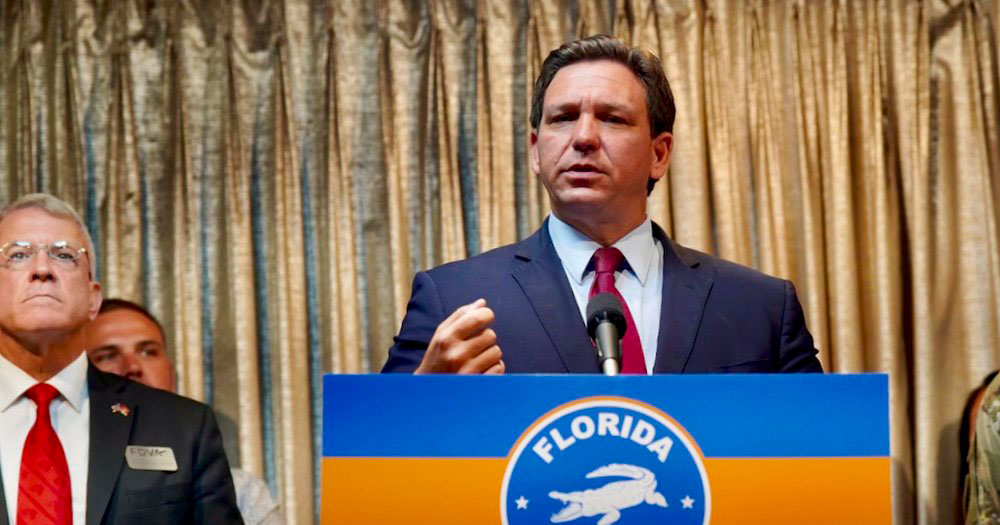Florida’s LGBTQ+ community were dealt a harsh blow to round off this year’s Pride month with the much-maligned ‘Don’t Say Gay’ law taking effect.
On Friday, July 1, 2022, the Parental Rights in Education bill, dubbed the ‘Don’t Say Gay’ law, was officially enacted after Republican Governor Ron DeSantis signed it into legislation last March.
Yesterday DeSantis marked the occasion by tweeting “Florida law now officially prohibits injecting sexuality and gender ideology into elementary school curriculum.”
Florida law now officially prohibits injecting sexuality and gender ideology into elementary school curriculum.
In Florida, we will protect our kids and support our parents. pic.twitter.com/rxjvnxEH9K
— Ron DeSantis (@GovRonDeSantis) July 3, 2022
The law, which is deliberately vague in its wording, prohibits any reference to sexual orientation or gender identity in classrooms from kindergarten to grade 3 (approximately 8 years of age) and also restricts references among older classes.
It suggests that any instruction on the subjects being issued from grades 4 to 12 should be “age-appropriate or developmentally appropriate” but fails to specify what these parameters are, leaving educators fearful of addressing the issues completely.
Despite Republicans claiming that the legislation is not intended to erase or censor the LGBTQ+ community, it permits parents to sue school districts that violate the new measures.
According to a tweet put out in January by DeSantis’s press secretary, Christina Pushaw, the bill was devised to protect children from ‘grooming’. She tweeted, “If you’re against the Anti-Grooming Bill, you are probably a groomer or at least you don’t denounce the grooming of 4-8-year-old children”.
Orange County teachers are being told they can’t wear rainbows. LGBTQ+ students need us to stand up for them, not try to push them back into the closet. @OCPSnews @orlandosentinel #StandUp #SafeSpaces #ActionsNotWords
— Clinton McCracken (he/him) (@mrclintonwarner) June 27, 2022
Clinton McCracken, president of the Orange County Classroom Teachers Association maintained that the bill was already having an impact. In a tweet put out last week, he said: “Orange County teachers are being told they can’t wear rainbows.”
He continued, “LGBTQ+ students need us to stand up for them, not try to push them back into the closet.”
In a report in the Advocate, the press secretary for Equality Florida Brandon Wolf asserted that some messages officials conveyed to teachers are absurd. He suggests that officials had said: “They should avoid talking about their families altogether so as not to run afoul of the law”.
Sadly, Florida’s ‘Don’t Say Gay’ law was only one of five new anti-LGBTQ+ laws which came into effect on Friday. Among them is Alabama’s ‘Bathroom Bill’ which requires students in public schools to use bathrooms and changing rooms designated for the gender on their birth certificate.
A second proposed Alabama legislation which was also due to come into effect on Friday criminalizing the provision of gender-affirming health care to trans youth has been held up due to a legal challenge.
Meanwhile, Tennessee implemented two laws to expand on the trans athlete ban which was imposed last year.
© 2022 GCN (Gay Community News). All rights reserved.
Support GCN
GCN is a free, vital resource for Ireland’s LGBTQ+ community since 1988.
GCN is a trading name of National LGBT Federation CLG, a registered charity - Charity Number: 20034580.
GCN relies on the generous support of the community and allies to sustain the crucial work that we do. Producing GCN is costly, and, in an industry which has been hugely impacted by rising costs, we need your support to help sustain and grow this vital resource.
Supporting GCN for as little as €1.99 per month will help us continue our work as Ireland’s free, independent LGBTQ+ media.
